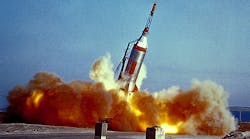“Failure is not an option,” according to NASA lore, but the value of that approach to life and work is more motivational than practical — and certainly not realistic in the life and work that occupies most of our days. In fact, the alleged source of the phrase, Eugene Kranz, NASA’s flight director from 1965 to 1994, apparently never uttered the words. Rather, he so embodied the determination indicated by the failure-is-not-an-option approach that screenwriters gave the line to the characterization of Kranz, and that gave him the title of his subsequent autobiography. Which is to say, it’s admirable to live a life undaunted by setbacks, but it’s irrational to expect that every enterprise will succeed.
This springs to my mind lately in response to the June 28 launch failure of an unmanned cargo mission by SpaceX, the aerospace manufacturer and space transport service provider. SpaceX, it should be noted, is among the private enterprises seeking to fill a void left by NASA’s feckless retreat from the space “space” — a fact that in itself shows a failure of imagination and commitment by the U.S. political and engineering class. As a nation we have resigned ourselves to deal only with mundane issues, so all that may be learned and gained by sending rockets and satellites (and perhaps people) into the upper and outer atmosphere will be the domain of private companies like Boeing, Lockheed, and SpaceX, among others.
SpaceX launched a rocket carrying a robot-guided capsule in a mission to resupply the International Space Station, but the rocket malfunctioned two minutes into the flight, destroying the vehicle and its cargo. The damage to SpaceX cannot be calculated, so far.
It should be relevant that SpaceX has conducted 19 previous orbital launches, and this is its first failure. The early era of civil aviation was replete with catastrophic events too, with many deaths and much loss of investment. NASA, of course, was notable in its early years for its launch failures. The triumphs of orbital, lunar, and Shuttle missions are more memorable to most of us because we record our memories as highlights, not data points.
Now SpaceX, and commercial space exploration in the more general sense, will be subjected to the simple analysis that the latest headlines and video clips make possible. There, SpaceX will be branded by the failure. If the company’s strategists respond to that, they will be conceding that in fact, “failure is not an option.”
But, there is an option for SpaceX: it can acknowledge the limits of it current technologies, subject its assets and resources to a deep review, and embrace the discovery that will follow this very public failure. The understanding that SpaceX must adopt, and communicate as widely as it can, is that failure may be an option but concession is not.
Dealing with failure is difficult, whether the failure is personal or public. It is worth pondering that this moment in human history — the moment in which the influence of social and government institutions is dissipating quickly, and individual autonomy is being asserted as justification for all sorts of stupid, profane, and uncivilized behavior —would be enhanced considerably by a public display of responsibility proportionate to the spectacle of SpaceX’s rocket exploding in flight.
But, what we would gain as spectators would be secondary to what SpaceX would gain as a public entity – one that is willing to acknowledge failure but is not phased by the setback and remains fully committed to its mission.
Gene Kranz gained his reputation for competence and determination by his actions, not his statements. He didn’t act as though failure is not an option, probably because he knew that failures are inevitable. That is our human condition. Failure is an option, and one we should learn to accept if we hope to make any progress in this world, or beyond it.









